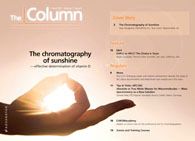LCGC Awards
LCGC has announced the winners of the 4th Annual Emerging Leader and Lifetime Achievement in Chromatography Awards.
LCGC has announced the winners of the 4th Annual Emerging Leader and Lifetime Achievement in Chromatography Awards.
The Emerging Leader award recognizes the achievements and aspirations of a talented young scientific or technical professional who has made strides early in their career towards the advancement of chromatographic applications and techniques. This year’s winner is Dwight Stoll who is currently an assistant professor at Gustavus Adolphus College, Saint Peter, Minnesota, USA. Dr Stoll developed fast, comprehensive two‑dimensional high performance liquid chromatography (c2D-HPLC) as an analytical tool capable of quickly separating and quantifying hundreds of chemical constituents of complex mixtures.
The Lifetime Achievement award honours a seasoned professional for a lifetime of contributions to the advancement of chromatographic techniques and applications. This year’s winner is James W. Jorgenson the William Rand Kenan, Jr. Distinguished Professor in the Department of Chemistry at the University of North Carolina, USA. Dr Jorgenson has authored or co-authored more than 100 journal articles, and has served on the editorial boards of seven different journals. His research concerns the use of capillary electrophoresis, capillary liquid chromatography and mass spectroscopy to solve problems in complex mixture analysis. His work on the use of ultra-high pressures in liquid chromatography is widely regarded as critical to the success of what is now known as UHPLC.
This story originally appeared in The Column. Click here to view that issue.
Investigating 3D-Printable Stationary Phases in Liquid Chromatography
May 7th 20253D printing technology has potential in chromatography, but a major challenge is developing materials with both high porosity and robust mechanical properties. Recently, scientists compared the separation performances of eight different 3D printable stationary phases.
Detecting Hyper-Fast Chromatographic Peaks Using Ion Mobility Spectrometry
May 6th 2025Ion mobility spectrometers can detect trace compounds quickly, though they can face various issues with detecting certain peaks. University of Hannover scientists created a new system for resolving hyper-fast gas chromatography (GC) peaks.
University of Oklahoma and UC Davis Researchers Probe Lipidomic Profiles with RP-LC–HRMS/MS
May 6th 2025A joint study between the University of Oklahoma Health Sciences Center (Oklahoma City, Oklahoma) and the UC Davis West Coast Metabolomics Center (Davis, California) identified differentially regulated lipids in type 2 diabetes (T2D) and obesity through the application of reversed-phase liquid chromatography-accurate mass tandem mass spectrometry (RP-LC-accurate MS/MS).

.png&w=3840&q=75)

.png&w=3840&q=75)



.png&w=3840&q=75)



.png&w=3840&q=75)









